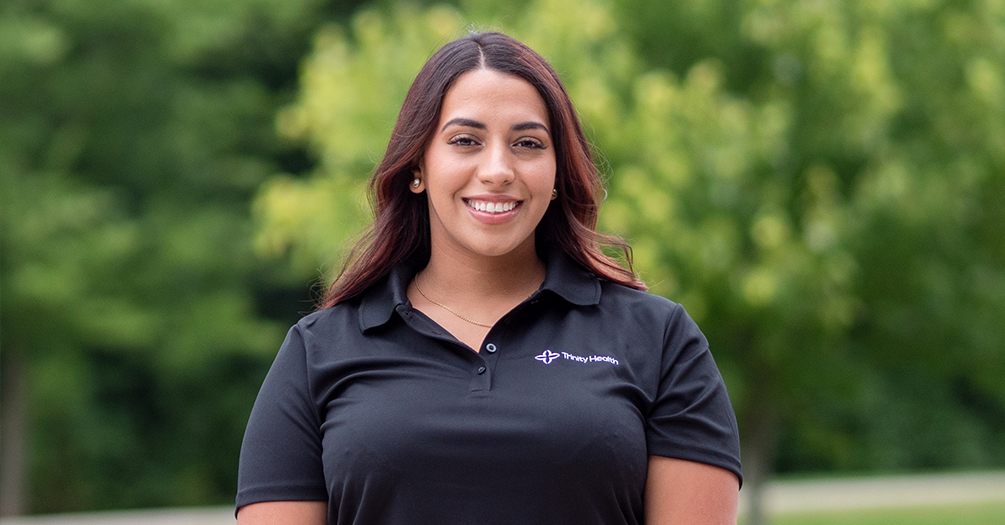Hybrid degree offers working mom unique experiences for career exploration

Julia Martinez-Hussein, BS '20
Master's Student, Health Management and Policy; Medical Assistant and Lactation Specialist, Trinity Health
When Julia Martienz-Hussein, BS ’20, started her career as a medical assistant, she quickly noticed gaps in care that left her disappointed and frustrated for her patients.
“I saw that patients were not getting the full extent of the system—not getting all that they deserved,” Martienz-Hussein said.
It was the desire to help these patients, in combination with her own life experience, that encouraged the Michigan Public Health alumna to return to public health.
“I wanted to look at health from a ‘big picture’ view—that brought me to public health,” she said.
Rather than leave those patients and a job she enjoyed, Martienz-Hussein found an opportunity to continue working and advance her education in public health with the department of Health Management and Policy Executive Master’s program.
She earned her bachelor’s degree from the School of Public Health in 2020, and she was confident coming back for an advanced degree would present her with opportunities to become a decision-maker in healthcare spaces and find solutions to the “gaps.”
The hybrid format of the Executive Master’s program means Martienz-Hussein can continue to work while learning in addition to gaining access to opportunities that are typically unavailable to working professionals.
“As a student, this is really the opportunity I have to explore various areas without wasting the time, resources and money, or having to get re-acclimated to a job,” she said. “I want to maximize all these opportunities that the School of Public Health has to offer so when I graduate I am confident that what I’m doing is exactly what I want to be doing.”
In undergrad, I really didn't pursue a lot of opportunities, or any student organizations, but with this master’s program, even with most of it being virtual, I have.
Martienz-Hussein is pursuing an array of skills and experiences related to health via internships, student groups and volunteering. She has taken on roles in a number of campus organizations, including the Student-Parent Advisory Board, where she participates in work toward affordable child care and inclusive syllabi policies; working on the advocacy team within the Health Policy Student Association; and acting as co-director of Social Community Engagement for La Salud, an advocacy group for the Latinx community.
As a student, she’s also been able to take on an internship with the Dearborn Public Health Department, gaining experience she couldn’t really gain in the provider setting that she’s currently in.
“I have a lot of experience and knowledge in maternal and infant health to offer them, but I can also use this time to learn the processes—how do they go about starting up programs, getting budgets approved and writing grants and things like that,” Martienz-Hussein said.
As a student parent, she says that working and going to school was always going to make life a little chaotic, so she aims to get the best out of it.
“I’m going to feel busy or tired either way so I want to do everything I can,” she said. "In undergrad, I really didn't pursue a lot of opportunities, or any student organizations, but with this master’s program, even with most of it being virtual, I have.”
While she’s exploring all that student-life can offer, she’s also keeping her eye on her original goal: to put herself in a position to create change and be a leader in healthcare.
One of my professors told us to ‘always be a doer’, and that, ‘yes, a lot of times you have to go through a lot of steps and hoops before you can actually implement something, but don't be afraid to just try things.’”
Martienz-Hussein said the Executive Master’s program is preparing her for leadership, particularly through the real-world experiences of the professionals that teach and guest-lecture in the program.
“Our professors, they’ve really worked in these roles—they have that experience—so, they are able to bring in guest speakers, their colleagues or people they've worked with in the past to share things about revenue cycle or different parts of healthcare, different parts of leadership,” she said. "That’s been really nice to get that exposure; we're able to have those contacts and can reach out any time.”
The mentorship-style learning has struck a chord with her as someone who already works within these same settings. She has valued the practical insights about being in management and how to interact and innovate as leaders.
“One of my professors told us to ‘always be a doer’, and that, ‘yes, a lot of times you have to go through a lot of steps and hoops before you can actually implement something, but don't be afraid to just try things,’” Martienz-Hussein said.
“I think, often in practice, people are just so used to doing things ‘because that's what we've always done’. In this program, we’re encouraged to stay up-to-date on best practices, join professional associations, and they offer a lot of resources so you can stay current on different processes that are in healthcare—all so that we are able to continue to be proficient in our roles.”
While she’s enjoying the time to learn and grow while earning her degree, Martienz-Hussein is eager to apply her new skills—wherever they take her.
“I’m ready to just work and have more time with my three children,” she said. “This is a shift in my career, so I really want to gain experience and get to work.”
